人教版高中英语必修五Unit1Greatscientists
Warming Up & Reading — Language Points
(一)根据英文释义和首字母提示写出单词
1.defeat: to win against sb. in a war, competition, sports, game etc.
2.attend: to be present at an event
3.cure:to make a person or an animal healthy again after an illness
4.challenge:a new or difficult task that tests sb.'s ability and skill
5.suspect:to have an idea that something is bad but without having definite proof
6.blame:to think or say that sb./sth. is responsible for sth. bad
7.absorb: to take in liquid, gas, or another substance from the surface or space around sth.
8.link: to make a connection between two or more things or people
(二)根据词性和汉语提示写出单词,并进行拓展
9.scientific adj.科学的→science n.科学→scientist n.科学家
10.conclude vt. & vi.结束;推断出→conclusion n.结论;结束
11.expose vt.暴露;揭露;使曝光→exposure n.暴露;曝光
12.pollute vt.污染;弄脏→polluted adj.受污染的→pollution n.污染
13.announce vt.宣布;通告→announcement n.宣告;通知
14.instruct vt.命令;指示→instruction n.说明
单词解析:
1.defeat
[教材原句] JOHN SNOW DEFEATS "KING CHOLERA"约翰·斯诺战胜"霍乱王"
(1)vt.打败;战胜;使受挫
①The team defeated his opponent and won the champion in the final of the competition.这个队在比赛的决赛中打败对手,获得冠军。
②The proposal was defeated by 16 votes to 6.因16票反对,6票赞成,该提议未能通过。
(2)n.[C,U]失败
③He always seems cheerful even in defeat.他总是看起来很高兴,即使输了也这样。
比较defeat, beat, win
defeat 击败,强调过程和结果 ,宾语是对手
beat 打败;(连续)击打, 宾语是对手
win 赢得;获胜,宾语是game或prize等
Yesterday I defeated/beat John at chess. He won only one set, while I won two sets.昨天我和约翰下棋赢了他。他只赢了一盘,而我赢了两盘。
2.attend vi.& vt.照料;护理(病人);出席;参加
[教材原句] John Snow was a famous doctor in London — so expert, indeed, that he attended Queen Victoria as her personal physician.
约翰·斯诺是伦敦一位著名的医生——他的确医术精湛,因而成了维多利亚女王的私人医生。
①The professor is rich in knowledge, so we all like to attend his lecture.这位教授知识渊博,因此我们都喜欢听他的演讲。
attend a meeting/a lecture/school参加会议/听报告/上学
attend (on/upon) sb. 照顾某人;伺候某人
attend to 处理;对付;接待(顾客);专心;注意
②Presidents from many countries attended the 2016 G20 Hangzhou Summit.来自许多国家的元首出席了2016年杭州G20峰会。
③He was badly injured. As a result, he was attended (on) by three nurses.他伤势严重。因此,有3名护士护理他。
[点津] 作"照顾;护理"讲时,可用attend,也可用attend on/upon;作"出席;参加"讲时,attend多作及物动词。
④Attend to your study and stop talking.专心学习,不要讲话。
⑤Excuse me, but I have an important matter to attend to.对不起,但我有件要事要办。
比较attend, join, join in, take part in
attend 指参加会议、上课、上学、听报告等;
join指加入某组织、团体,成为其中的一员;
join in 指参加某种活动,表示与某人一起做某事,可构成join sb. in sth.结构;
take part in 指参加群众性活动、会议等,往往指参加并持积极态度,起一定作用。
①I often attend meetings and sometimes I join in/take part in their discussion.我经常出席会议,有时参与大会的讨论。
②My wish is to join the army after graduation.我的愿望是毕业后参军。
③Lincoln took an active part in politics and was strongly against slavery.林肯积极参加政治活动,强烈反对奴隶制度。
3.expose vt.暴露;揭露;使曝光;使接触
[教材原句] But he became inspired when he thought about helping ordinary people exposed to cholera.但当他一想到要帮助(那些)受到霍乱威胁的普通百姓,他就感到很振奋。
(1)expose sb./sth. to ...使某人/某物暴露于……;使某人/某物接触到……
(2)be exposed to ... 暴露于……;置身于……
exposure n. 暴露;揭发
①Exposed to such disasters, the local people were badly in need of help.当地人深陷于如此大的灾难中,他们急需帮助。
②Don't expose yourself to the sun for too long. You will get burnt.别在太阳下晒得太久,你会被晒伤的。
③We want to expose the kids to as much art and culture as possible.我们想让孩子们受到尽可能多的艺术和文化熏陶。
④A teacher should expose_his_students_to reallife situations.教师应让他的学生们接触到真实的生活环境。
4.cure n.[C]治愈;疗法vt.治愈;治疗;改掉(坏习惯)
[教材原句] Neither its cause nor its cure was understood.(人们)既不知道它的病源,也不了解它的治疗方法。
①Doctors are searching for a cure for AIDS.医生们正在寻找艾滋病的治疗方法。
②There is no way to cure or prevent Ebola, though experimental vaccines are on the way.尽管实验性的疫苗正在研制中,但市场上还没有治愈或预防埃博拉病毒的方法。
③We must cure the children of bad habits.我们必须纠正孩子们的坏习惯。
④This medicine will cure you of your headache.这种药可治好你的头痛。
⑤a cure for ... 治愈某种病的疗法
⑥cure sb. of sth. 治愈某人的病;改掉某人的坏习惯
比较cure, treat
cure强调结果,即“治愈”,可构成cure sb. of sth.结构;
treat调过程,不涉及结果,可构成treat sb. for sth.结构.
①The doctor treated her headache with a new medicine, but didn't cure her.
②He was treated for his heart disease for three months, but the doctors said they could cure him of it in one month.
5.challenge n.[C,U]挑战 vt.向……挑战
[教材原句] John Snow wanted to face the challenge and solve this problem.约翰·斯诺想面对这个挑战,解决这个问题。
①To prevent hazes from happening frequently is a great challenge for most cities in China.对于中国的大部分城市来说,阻止雾霾天气的频繁发生是一项巨大的挑战。
(1)face the challenge 面临挑战
accept/take up a challenge 接受挑战
(2)challenge sb. to sth. 向某人挑战某事
challenge sb. to do sth. 向某人挑战做某事
②He accepted a challenge to a TV debate.他接受了电视辩论的挑战。
③When I said I ran faster than her, she challenged me to a race.当我说我跑得比她快时,她硬逼着要和我赛跑。
④Mr Wang challenged me to (play) another tennis game.王先生向我挑战再打一场网球比赛。
[点津] challenge本身已含"向……;对……"的意义,因而不要再加多余的to。
challenge sb.向某人挑战
6.absorb vt.吸收;吸引;使专心
[教材原句] The second suggested that people absorbed this disease into their bodies with their meals.第二种看法是人们是在吃饭时把这种病毒吸入体内的。
①This kind of paper absorbs ink.这种纸吸墨水。
absorb ... into ... 把……吸入……
absorb ... from ... 从……中吸收……
absorb sb.'s attention 吸引某人的注意
be absorbed in 专心于;全神贯注于
②Plants can absorb nutrients from the soil.植物能从土壤中吸收养分。
③A studentcentered class can absorb students' attention.以学生为中心的课堂可以吸引学生的注意力。
④Absorbed in his work, Tom simply forgot food and sleep.汤姆专心工作,几乎忘记了吃饭和睡觉。
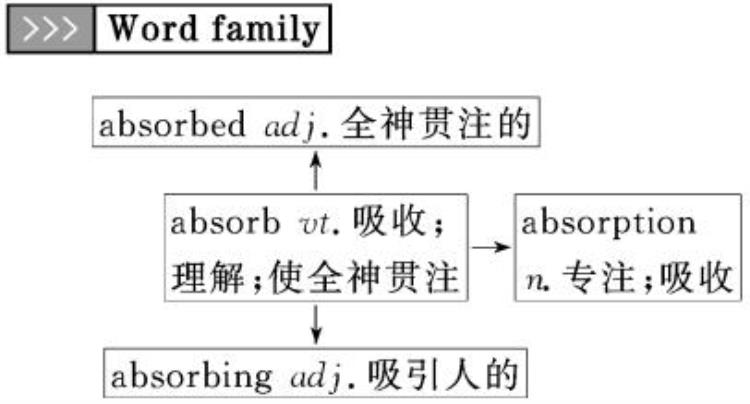
7.suspect
[教材原句] John Snow suspected that the second theory was correct but he needed evidence.
约翰·斯诺推测第二个理论是正确的,但他需要证据。
(1)vt.怀疑;认为
①Never employ the man you suspect, nor suspect the man you employ.[谚语]疑人不用,用人不疑。
suspect that ... 怀疑……;觉得……
suspect sb. of (doing) sth. 怀疑某人(做过)某事
②What makes you suspect_him_of stealing the money?你凭什么怀疑钱是他偷的?
③I suspect that he is a thief.我怀疑他是个小偷。
(2)n. [C]嫌疑犯
④The police have taken the suspect to the police station.警察把那个嫌疑犯带到了警察局。
8.blame
[教材原句] It seemed that the water was to blame.看来水是罪魁祸首。
(1)vt.责备;指责;把……归咎于
be to blame (for sth.) 对(某事)负有责任;(因某事)应受责备
blame sb. for (doing) sth. 因(做)某事而责备某人
blame sth. on sb. 把某事归咎到某人身上
①Don't always blame your own failure on others. Sometimes you yourself are to blame.
不要总把自己的失败归咎于他人。有时该怪你自己。
②There was no evidence that the pilot was to blame for the air crash.没有证据表明飞行员要为这场空难负责。
(2)n.[U]过失;责备
bear/take/accept/get the blame (for sth.)(对某事)承担责任
put/lay the blame for sth. on sb.将某事归咎于某人
③I am ready to take the blame for what I said.我已准备对我所说的负责。
④She'll put/lay the blame on me if it gets bad.如果事情变糟,她会把此事归咎于我。
9.announce vt.宣布;宣告(决定、计划等);(尤指通过广播)通知
[教材原句] With this extra evidence John Snow was able to announce with certainty that polluted water carried the virus.有了这个特别的证据,约翰·斯诺就能够肯定地宣布,这种被污染了的水携带着病毒。
(1)announce sth.(to sb.) (向某人)宣布、通告某事
announce that ... 宣布……;通知……
It is announced that ...据宣布……
(2)announcement n. 通知;通告
make an announcement宣布;下通知
(3)announcer n. 广播员;播音员
①Guangdong police announced a reward for reporting crime clues.广东警方宣布将给予提供犯罪线索者一笔赏金。
②The spokesman of the Foreign Ministry announced the news to the reporters.
= The spokesman of the Foreign Ministry announced_to the reporters the news.
外交部发言人向记者发布了新闻。
[点津] 表示"向某人宣布某事"用announce sth. to sb.或announce to sb. sth.,而不用announce sb. sth.。
③It is announced that there will be a celebration on National Day.据宣布,国庆节要举行庆祝会。
④The announcer made an announcement that all the details should be announced through the broadcast.广播员宣布所有的细节都应通过广播公布出来。
比较announce, declare
announce指正式公布、宣布,侧重预告人们关心或感兴趣的事情,尤指新闻
declare指正式向公众宣布,侧重“当众发表”,多用于宣战、议和或宣判等。declare后可跟复合宾语
①The date of his visit has not been announced.他来访的日期尚未公布。
②Fighting has been going on for a year, but war has not yet been declared.仗已打了一年,但并没有宣战。
10.instruct vt.命令;指示;教导
[教材原句] The water companies were instructed not to expose people to polluted water any more.供水公司得到指示,再也不能让人们接触受污染的水了。
①When I met him, he was instructing his son how to deal with the car problem.当我见到他时,他正在教儿子如何修汽车。
(1)instruct sb. in sth. 教授某人某事
instruct sb. to do sth. 命令某人做某事
(2)instruction n.[用复数]说明书;使用指南
[C,常用复数]指示;命令
give sb. instructions to do sth.命令某人做某事
follow one's instructions 听从某人的指示
②My job is to instruct her in English.我的工作是教她英语。
③He instructed me to deliver it to a customer.他吩咐我把东西传送给顾客。
④The teacher gave them instructions to arrive early tomorrow morning.老师命令他们明天早晨要早到。

1.put forward 提出;推荐
2.draw a conclusion 得出结论
3.expose ... to ... 使显露;暴露
4.of sb.'s/sth.'s day 在某人/某物存在的时候
5.face a challenge 面临挑战
6.mark ... on ... 在……上把……标出来
7.be to blame 该受责备;应负责
8.link ... to ... 将……和……联系或连接起来
9.look into 调查
10.slow down 减速;减缓

1.put forward提出;拨快;将……提前;推荐
[教材原句] Who put forward a theory about black holes?谁提出了黑洞理论?
写出put forward在下列句子中的汉语意思
①Since last year, China has put forward a series of important suggestions. 提出
②The women's final has been put forward to 2:00 pm.提前
③He put his watch forward to avoid being late for the meeting.拨快
④We put Mary forward to take part in the competition to find a designer for the new airport building.推荐;提名

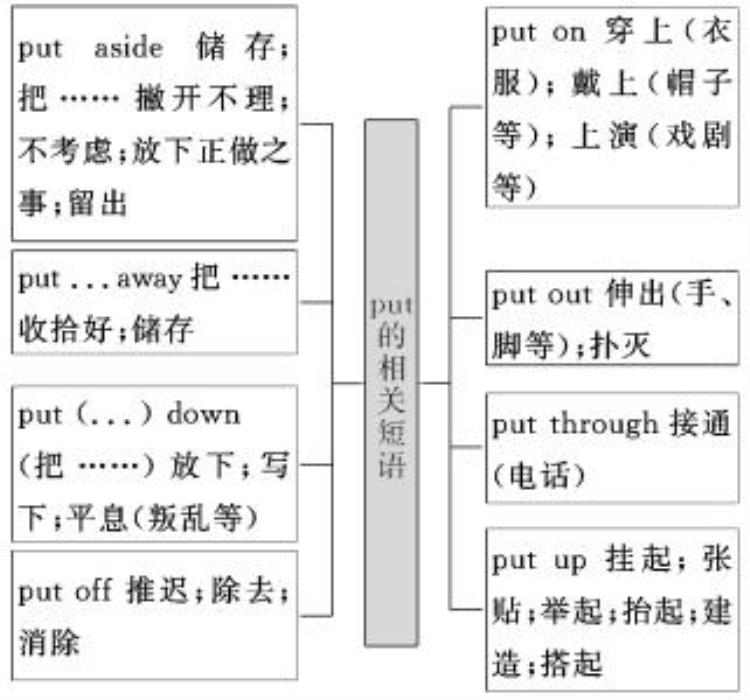
⑤We're trying to put aside a few hundred dollars every month towards our vacation.我们尽量每月存几百美元供度假用。
⑥Before we leave the office, let's put these files away.离开办公室之前,让我们把这些文件收拾好。
2.draw a conclusion得出结论
①The debate did not arrive at/come to/reach/draw a conclusion until midnight.辩论直到午夜才得出结论。
②In conclusion, I'd like to say how much I have enjoyed myself.最后,我想说说我过得有多么愉快。
③arrive at/come to/reach/draw a conclusion得出结论
④in conclusion最后
conclude v. 结束;推论;推断;以/做某事结束(某事)
conclude ... from ... 从……推断出……
conclude (from sth.) that ... (从某事)推断……
⑤We will conclude our concert with the National Anthem.我们将以国歌结束我们的音乐会。
⑥What do you conclude_from the experiment?从这次实验中你得出了什么结论?
⑦From the evidence I must conclude that you are wrong.从证据看,我敢断定你错了。
3.link ... to/with ...将……和……联系或连接起来
[教材原句] In another part of London, he found supporting evidence from two other deaths that were linked to the Broad Street outbreak.在伦敦的另一个地区,他从两个与宽街暴发的霍乱有关联的死亡病例中又发现了有力的证据。
①For centuries farmers have linked the behavior of animals to changes in the weather.几个世纪以来农民们一直把动物行为与天气变化联系在一起。
②A spokesman said six suspects linked with the attack had been arrested.一位发言人说和这起攻击案件有关联的六个嫌疑人已经被捕。
link up (with) (与……)连接;联合
join ... to/and ... 把……与……连接起来
connect ...to/with/and ...把……与……连接起来
relate ...to ... 把……和……联系起来
combine ...with ... 把……和……联合起来
③The bands have linked up for a charity concert.这些乐队已联合起来,准备办一场慈善音乐会。
④Wealth is seldom related to happiness.财富鲜与幸福相关。

1.[句型展示] Neither its cause nor its cure was understood.(人们)既不知道它的病源,也不了解它的治疗方法。
[典例背诵]
In autumn, it's neither too hot nor too cold.(天津高考标准范文)秋天,既不太热又不太冷。
2.[句型展示] So many thousands of terrified people died every_time there was an outbreak.
因此每次(霍乱)暴发,就有成千上万惊恐的人们死去。
[典例背诵]
Every time he comes to Harbin, he always drops in on me.每次他来哈尔滨,总是顺便来看看我。
3.[句型展示]
①The first suggested that cholera multiplied in the air.第一种看法是霍乱病毒在空气中繁殖。
②To prevent this from happening again, John Snow suggested that the source of all the water supplies be examined.为防止这种情况再度发生,约翰·斯诺建议所有水源都要经过检测。
[典例背诵]
①All the facts suggest that failure is the mother of success.所有的这些事实表明失败是成功之母。
②I suggest we should communicate with our friends face to face.我建议我们应该与朋友面对面交流。
4.[句型展示] A woman, who had moved away from Broad Street, liked the water from the pump so much that she had_it_delivered to her house every day.一位已经从宽街搬走的妇女,特别喜欢从那个水泵里抽上来的水,每天都要让人把水送到她家。
[典例背诵]
If you listen more and speak more, you will have your English improved.如果你多听多说,你的英语就会得到提高。

1.So many thousands of terrified people died every_time there was an outbreak.因此每次(霍乱)暴发,就有成千上万惊恐的人们死去。
every time在句中引导时间状语从句,与each time相同,意为"每次……的时候"。
①Every time I went to Beijing I would visit the Great Wall.我每次去北京都会去参观长城。
②Every time I see him, he's always wearing a smile on his face.我每次见到他时,他总是面带笑容。
可以用作连词引导时间状语从句的名词短语有以下三类:
(1)表示习惯、经常性:every time, each time, next time, the first/second/last/... time等。
③The first time I went abroad, I couldn't understand what foreigners said.第一次出国时,我听不懂老外说什么。
(2)表示瞬间变化,意为"一……就……":the moment, the minute, the instant, the second等。
④The moment I saw him, I knew what had happened.见到他的那一刻,我就知道发生了什么事。
(3)表示具体时间,意为"……的那天/那周/……":the day, the week, the month, the year, the spring, the summer, the autumn, the winter等。
⑤We got together the night he returned from abroad.他从国外回来的那个晚上我们聚会了。
2.To prevent this from happening again, John Snow suggested that the source of all the water supplies be examined.为防止这种情况再度发生,约翰·斯诺建议所有水源都要经过检测。
句中suggest表示"建议",另外suggest还有"表明;暗示"的意思。其用法如下:
①His attitude suggested that he was not interested in it at all.他的态度表明他对此一点也不感兴趣。
②Education experts suggest parents should be more careful when sending their young children abroad.教育专家建议在把孩子送往国外时家长应该格外小心。
③My deskmate's sleepy look suggested that he was tired of his study and I suggested he (should) have/take a rest.我的同桌困倦的表情显示他学习累了。我建议他休息一下。
3.A woman, who had moved away from Broad Street, liked the water from the pump so much that she had it delivered to her house every day.一位已经从宽街搬走的妇女,特别喜欢从那个水泵里抽上来的水,每天都要让人把水送到她家。
句子结构分析:
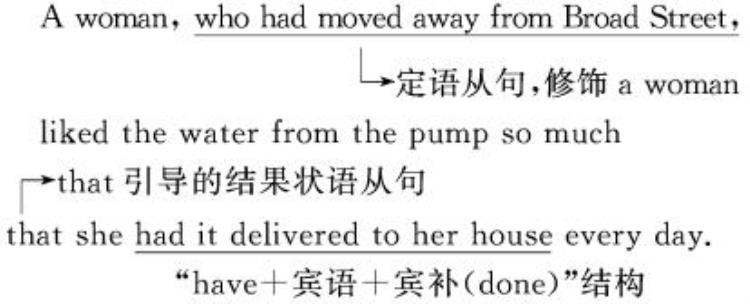
句中had it delivered是"have+sth.+过去分词"结构,该结构有以下三种常见用法:
(1)表示"请/让别人做某事",句中所用的便是此意。
①I'll have my bike repaired tomorrow.我明天得(请人)修一下我的自行车。
(2)表示"经历或遭遇(一些不好的事)"。
②She had her computer stolen the other day.前几天她的电脑被偷了。
(3)表示"完成/解决某事",此时主语也可能是过去分词所表示的动作的执行者。
③When will you have your homework handed in?你什么时候交家庭作业?
比较have sth. done, have sb. do, have sb. doing
have sth. done让/叫/使/请别人做某事。宾语sth.后面用过去分词作宾语补足语,sth.与过去分词表示的动作之间是被动关系
have sb. do让某人做某事。do与sb.是主动关系
have sb. doing让/叫/使某人一直做某事。doing与sb.是主动关系
①You shouldn't have your horse running so fast. It's too dangerous.你不该让你的马跑得这么快。这太危险了。
②I have my husband do some housework every day.我每天让丈夫做些家务。
③He had his leg broken while playing football.他踢足球时摔断了腿。
Section Ⅲ
Learning about Language & Using Language

根据词性和汉语提示写出单词,并进行拓展
1.construct vt.建设;修建→construction n.建设;建筑物
2.contribute v.捐献;贡献;捐助→contribution n.贡献;捐款
3.positive adj.积极的;肯定的;确实的→negative(反义词)消极的;否定的
4.backward adv. & adj.向后地(的);相反地(的);退步地(的)→forward adv. & adj.向前地(的)
5.enthusiastic adj.热情的;热心的→enthusiasm n.热情;热心
6.cautious adj.小心的;谨慎的→caution n.小心;谨慎
7.reject vt.拒绝;不接受;抛弃→rejectionn.拒绝;拒绝接受;厌弃
8.move v.移动;搬家→movementn.移动;运动

1.construction n. [U]建设[C]建筑物
[教材原句] Look at these simple verbs and make another construction using make+a+noun.
看这些简单动词并用"make+a+noun"构成另一个结构。
①The entire city stopped all construction work for days just to ensure clean air.为了确保空气的清洁,数天来全市停止了所有的建筑工作。
(1)be under construction 正在建设中
(2)construct vt. 建设;修建
be constructed of/out of/from ... 由……建成
②The new railway is still under construction.新铁路仍在建设中。
③The shelter was constructed out of fallen branches.这个窝棚是用落下的枯树枝搭成的。
2.contribute v.捐助;捐献;投稿;对……有贡献;有助于
①Most people contributed some money towards the new church buildings.大部分人都为教堂的新建筑捐了钱。
(1)contribute ...to ... 向……捐献/赠……;给……提供(忠告、建议);投稿
contribute to 有助于;促使;导致
(2)contribution n. 贡献;捐款
make a contribution/contributions to (doing) ... 对……做贡献
②She contributed a number of articles to the magazine.她给这家杂志撰写了很多稿件。
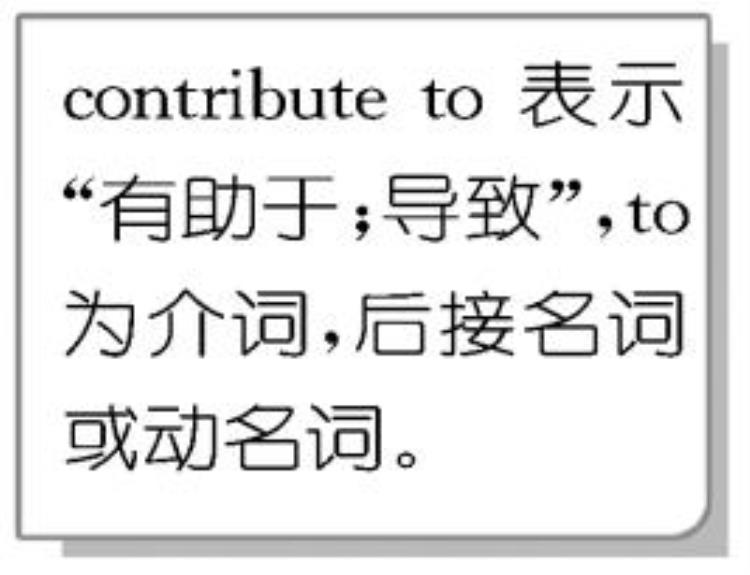
③I am sure your suggestion will contribute to solving the problem.我肯定你的建议将有助于解决问题。
④Over 80 companies have settled in the park so far, making great contributions to the development of the local economy.迄今为止,80多家公司落户该产业园,对当地经济的发展做出了巨大贡献。
3.reject vt.拒绝;不接受(提议、建议等);拒绝(雇用、录取等);抛弃;(因质量不好而)废弃
[教材原句] The Christian Church rejected his theory, saying it was against God's idea and people who supported it would be attacked.基督教会拒绝接受他的理论,说这种理论违背了上帝的旨意,谁支持这一理论谁就将受到攻击。
写出reject在下列句子中的汉语意思
①They reject plans to raise the retirement age from 65 to 66 starting in 2025 and to 67 in 2030. 不接受
②I've been rejected by all the universities I applied to.拒绝录取
③All the food that went bad was rejected by my mother.抛弃;废弃

1.come to a(n) end 结束
2.apart from 除……之外;此外
3.(be) strict with ... 对……严格的
4.lead to 通向;导致
5.make sense 讲得通;有意义
6.at times 有时
7.be responsible for 对……负责
8.make room for 为……腾地方

1.apart from
[教材原句] Apart from the construction mentioned above, you have also learned the following phrases. 除了以上提到的结构,你们还学过下面的短语。
(1)除了……之外(还); 此外(相当于in addition to 或as well as)
Only a handful of countries, apart from China, have ever developed deep seadiving.除了中国,仅有少数国家研发了深海潜水技术。
(2)除了……之外(相当于except)
I hardly know anyone in the village apart from you.除你之外,我几乎不认识村里的任何人。
(3)除了;只是(相当于except for)
Apart from a few faults, he is a faithful friend.除了有几个缺点外,他是一位值得信赖的朋友。
比较apart from, in addition to, besides, except, except for, except that
apart from重在强调,既含有“除了……还有”,也含有“把……排除在外”之意
in addition to“除……之外还”,一般位于句首
besides表示“除了……还有”
except表示“把……排除在外”
except for表示从整体情况来看,要排除其中的部分特殊情况
except that意思与except for相同,后须接从句
①In addition to/Besides/Apart from their house in London, they also have a villa in Spain.
他们在伦敦有一座房子,此外在西班牙还有一座别墅。
②Everything was perfect except_for/apart_from the weather.除了天气之外,一切都很完美。
③I don't know much about the man except_that he's a fool.我除了知道他是个傻瓜外,其他情况所知甚少。
④The shop is open every day except on Sundays.除了星期天之外,这家商店每天都营业。
2.be strict with ...对……严格的
①Hong Chen's parents are strict with her.洪辰的父母对她要求很严格。
②To do this, we must be strict with the members.为了做到这一点,我们必须严格要求队员。
(1)be strict in (doing) sth. 对(做)某事要求严格
(2)strictly speaking 严格地说
③We should be strict in (doing) our work.对工作我们应该严格要求。
3.make sense讲得通;有意义
[教材原句] Only if you put the sun there did the movements of the other planets in the sky make sense.只有当你把太阳放在中心位置上,天空中其他行星的运动才能说得清楚。
①It makes sense to save money while you can.钱能省就省,这很明智。
make no sense 没有道理;没有意义
make sense of 明白;理解
in a sense 从某种意义上说
in no sense 决不
There's no sense in doing ...做……是没有道理/作用的
②Who would send me all these flowers? It really makes no sense.谁会送给我这么多花呢?真是不可思议。
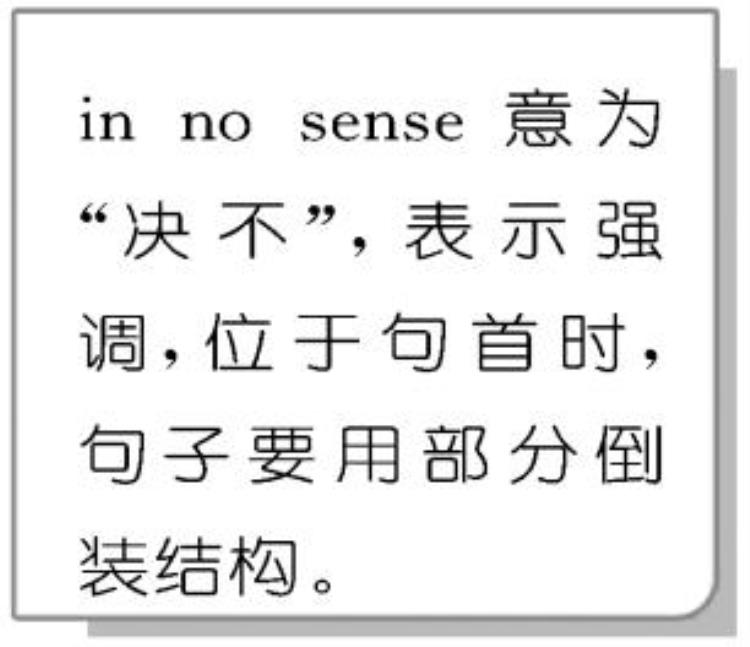
③We all couldn't make sense of that painting.我们都没有理解那幅画。
④In no sense can you do that again.你决不能再那样做了。
⑤There is no sense in worrying about it now.现在担心这件事已没有必要了。

1.[句型展示] I had_expected it to be better.我本期望会更好。
[典例背诵]
I had expected much from his speech, but nothing new came.我曾对他的演讲抱有很大希望,但实际上没有什么新鲜东西。
2.[句型展示] Only_if you put the sun there did the movements of the other planets in the sky make sense.只有当你把太阳放在中心位置上,天空中其他行星的运动才能说得清楚。
[典例背诵]
Only if we love life will we never run out of our inspirations.只有热爱生活,我们的灵感才不会枯竭。
3.[句型展示] He placed a fixed sun at the centre of the solar system with the planets going round it and only the moon still going round the earth.他把固定的太阳放在太阳系的中心,别的行星都围绕太阳转动,只有月亮仍然围绕地球转动。
[典例背诵]
With the beautiful moon up in the sky, we sit together and eat mooncakes and fruits, sharing our stories.美丽的月亮高挂在天空,我们坐在一起吃着月饼和水果,一起分享我们的故事。

1.Only if you put the sun there did the movements of the other planets in the sky make sense.只有当你把太阳放在中心位置上,天空中其他行星的运动才能说得清楚。
这是一个倒装句,"only+状语或状语从句"放于句首要使用部分倒装,即把助动词、情态动词或系动词be 放在主语之前。
①Only in this way can we solve the problem.只有通过这种方式,我们才能解决这个问题。
②Only when he returned did we find out the truth.只有他回来时我们才发现了真相。
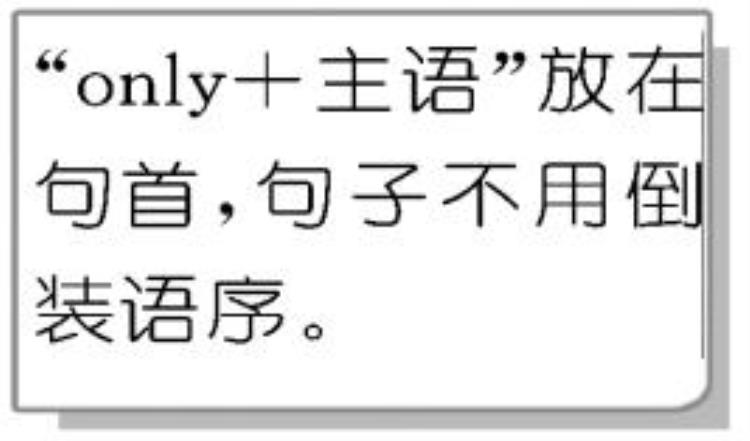
③Only she can do it well, for she is more experienced.只有她才能把它做好,因为她更有经验。
①If only I were slimmer, more beautiful, richer and more clever!要是我更苗条一些、更漂亮一些、更富有一些、更聪明一些该多好啊!
②You will pass the driving test only if you practice hard.只有努力练习,你才能通过驾照考试。
2.He placed a fixed sun at the centre of the solar system with_the_planets_going_round_it and only the moon still going round the earth.他把固定的太阳放在太阳系的中心,别的行星都围绕太阳转动,只有月亮仍然围绕地球转动。
with the planets going round it 是"with+宾语+宾语补足语"结构,在句中作状语,表示原因、条件、伴随等。此外,此结构还可作后置定语。
①The little boy ran along the street with nothing on.这个小男孩沿街跑着,什么也没穿。
②With prices going_up,_we can't afford too many clothes.随着物价的上涨,我们买不起太多的衣服。
③I sat in my room for a few minutes with my eyes fixed on the ceiling.我在房间里坐了一会儿,眼睛盯着天花板。
④I can't go out with all these dishes to_wash.我不能丢下这些要洗的碟子就出去。
⑤We live in a house with many flowers around it.我们住在一所周围有很多花的房子里。
Section Ⅳ
Grammar & Writing
过去分词作定语和表语
过去分词是非谓语动词的一种形式。从语法功能分析,过去分词兼有动词、形容词或副词的特性,可在句中充当定语、表语、宾语补足语或状语。过去分词通常与逻辑主语之间存在被动关系,表示被动或完成。
一、过去分词作定语
1.过去分词作定语时的意义
不及物动词的过去分词作定语,只表示动作已完成,不表示被动的意义;及物动词的过去分词作定语表示被动意义或已完成的被动动作。
(1)只表示完成不表示被动
fallen leaves 落叶
the risen sun 升起的太阳
a retired teacher 一位退休的教师
(2)表示被动
an honored guest 一位受尊敬的客人
a guided trip 一次有导游的旅行
(3)表示被动和完成
the broken glass 碎了的杯子
the question discussed yesterday昨天讨论的问题
a divided country 一个分裂的国家
2.过去分词作定语时的位置
(1)前置定语:单个的过去分词作定语,通常放在被修饰的名词之前。
The broken vase has been thrown outside.那个打碎的花瓶已被扔到外面去了。
The injured workers are now being taken good care of in the hospital.受伤的工人现在正在医院受到良好的照料。
(2)后置定语:过去分词短语作定语时,通常放在被修饰的名词之后,它的作用相当于一个定语从句。
The suggestion (which had been) sent to the committee was adopted.呈送给委员会的建议被采纳了。
This will be the best novel of its kind ever written(= that has ever been written).这将是这类小说中写得最好的。
①The producer comes regularly to collect the cameras returned (return) to our shop for quality problems.
②You cannot accept an opinion offered (offer) to you unless it is based on facts.
[点津] ①有些过去分词表示特定含义时,单独作定语也放在所修饰的名词之后,如left(剩余的),given(所给的),concerned(有关的)等。
There is little time left. Let's hurry up.剩余的时间不多了,我们赶快吧。
②过去分词修饰代词时,应置于被修饰词之后。
He is one of those invited.他是那些被邀请的人之一。
③有些过去分词作定语,前置和后置意义不同。试比较:
This is a used car which is worth only 5,000 yuan.这是一辆仅值五千元的旧车。
The method used is very efficient.所用的这个方法很有效。
④过去分词可作非限制性定语,用来补充说明被修饰词的情况,前面常用逗号与被修饰的成分隔开。
A girl, dressed like a student, came in and sat beside me.一位学生打扮的女孩走进来,坐在我的旁边。
3.现在分词和过去分词作定语的区别
(1)过去分词与所修饰的名词之间存在动宾关系,表示一个已完成的动作。现在分词与所修饰的名词之间存在主谓关系,它表示一个正在进行的动作。
This is a letter written in black ink.这是一封用黑墨水写的信。
There are so many people showing interest in surfing the Internet.有那么多人对上网感兴趣。
(2)过去分词作定语表示被修饰的人或相关的人的自身感受,现在分词作定语表示被修饰的人或物对别人造成的感受。
Have you noticed the surprised expression on his face?你注意到他脸上惊讶的表情了吗?(他很惊讶)
What came to us was surprising news.我们得到的是令人吃惊的消息。(消息令人吃惊)
二、过去分词作表语
1.过去分词可放在系动词be, get, feel, remain, seem, look, become, stay等之后作表语,表示主语所处的状态。
He seemed quite delighted at the news.听到这个消息他似乎很高兴。
The door remained locked.门仍然锁着。
2.过去分词作表语多表示人自身的感觉、感受或事物自身的状态;现在分词作表语则多表示事物具有的特性,常译作"令人……的"。
He became discouraged.他泄气了。
The situation proves encouraging.形势是令人鼓舞的。
①There were many people waiting at the bus stop, and some of them looked very anxious and disappointed (disappoint).
②For some reason he sat beside Mary. Mary felt pleased (please), because there were many empty seats in the room.
[点津] 英语中有很多与感觉有关的及物动词,其现在分词表示主动意义,即"令人有某种感觉的",多用来修饰物;其过去分词含有被动意义,即"人被引起某种感觉的",多用来指人、人的声音或表情等。
The story they heard over the radio was very moving.他们从收音机里听到的这个故事很感人。
She was moved by his moving speech.她被他动人的演说感动了。
They were frightened to hear the frightening sound.他们听到那可怕的声音很害怕。
The chairman announced the exciting news in an excited voice.主席用一种兴奋的声音宣布了这个令人激动的消息。
Alice read the letter with a puzzled expression on her face.艾丽丝脸上带着一种迷惑的表情读了这封信。
3.过去分词作表语时与被动语态的区别:"be +过去分词"表示状态时,是系表结构,此时分词通常已形容词化;表示动作时,是被动语态,且绝大多数被动结构中的动作执行者由介词by引出。
The book is well written.(系表结构,强调主语所处的状态)这本书写得很好。
The book was written by a soldier.(被动语态,强调主语所承受的动作)这本书是一位战士写的。

劝说性书信
假如你是高二学生李华,你的一个在外地读书的同学张力给你写信,向你诉说他最近因为身体不好而影响学习的情况,并且坦言自己平时学习忙,很少锻炼。请你根据这一情况给张力写一封回信,劝说并鼓励他积极锻炼身体,从而为更好地学习打下基础。
Dear Zhang Li,
I am sorry to hear that you have been ill for days and I hope you have got better now. You have studied so hard that you have had no time for exercise. ①But it is really harmful to your health.②I feel it would be more beneficial to your health if you could take more exercise in future.
③You may think that time spent in exercise is wasted. ④In fact, exercise can improve your physical condition and refresh your mind. ⑤After one or two hours of exercise you can study better. ⑥Only when you have a strong body can you keep on studying without feeling bad or ill.⑦Otherwise your study will be interrupted from time to time by sickness.
⑧I am not advising you to devote all your time to exercise. ⑨What I want to say is that exercise is as useful and important as your study. ⑩So I recommend that you take at least one hour's exercise every day from now on. ⑪I would be more than happy to see you have a stronger body.
Sincerely yours,
Li Hua

第一段一开始作者就表达了对同学的关心,并提出自己的观点,为下文做铺垫。
第二段详细说明锻炼身体的重要性。
最后一段提出自己的建议,希望同学抽出时间进行锻炼。

亮点一:文章中使用了一些高级词汇,如①句中的be harmful to,②句中的be beneficial to,⑧句中的advise sb. to do,⑪句中的more than等。这些词汇的应用,增强了文章的可读性。
亮点二:文章中使用了一些高级句式,如②句中的it作形式主语及虚拟语气,⑥句中的only引起的倒装句,⑨句中的what引导的主语从句和that引导的表语从句,⑩句中的recommend后的宾语从句等。高级句式的使用,使得整篇文章流畅、地道。

劝说性书信的写作目的是向某个组织或个人提出劝说性建议的一种应用文体。先提出建议,随后给出充足的理由劝说对方接受你的建议,提出的理由要合情合理,用词要恰当,既要委婉礼貌,又要有说服力。
写作时注意以下几点:
1.形式要简洁,通常主要由称呼(Salutation)、正文(Body)、结束语(Closing)和签名(Signature)组成。
2.开门见山,直入主题。在书信正文的开头找准话题的切入点,自然而然地引出自己想要谈的主题。写信时要充分了解情况,有的放矢,以提高书信的针对性。
3.给出希望对方采取或者终止某种行为的理由。在陈述理由的过程中要换位思考,尽量为对方考虑。要用事实说话,以增强说服力。
4.语气要和缓,让对方考虑你的想法或者建议,以理服人是关键,不能把自己的想法强加于人。
5.给出合理建议,通过提建议让对方明确行动的方向,从而达到写信的最终目的。
1.I am writing to express my views about ...
2.I am writing to persuade you to ...
3.First of all, I think it would be better if ...
4.Here I'd like to give my advice on .../I'd like to suggest that ...
5.If I were you, I would ...
6.I strongly hope that you can ...
7.What/How about doing ...?
8.I think it would be more beneficial if you could ...
9.In my opinion, you should ...
10.In my experience, it seems that ...
11.Please take my advice into consideration and make a final decision.
12.I will be more than happy to see improvements in this regard.

假设你是李萍,你的笔友王强最近沉迷于电脑游戏而不能自拔,严重影响了学习和身心健康。请你给他写一封书信,劝说他改掉这一不良习惯,并对他的学习生活给出自己的建议。
注意:
1.词数:100左右;
2.可适当增加细节,以使行文连贯。
________________________________________________________________________
________________________________________________________________________
________________________________________________________________________
参考范文:
Dear Wang Qiang,
I felt very worried when I heard that you were addicted to computer games. Although it's generally believed that computer games are interesting and can inspire our imagination, yet if you abuse them, they will be harmful to you in many ways. To begin with, they will waste too much valuable time which should be spent on your study or other beneficial things. In addition, playing games for a long time will do harm to your health, especially to your eyes. Worse still, some games are full of violence, which will be harmful to your mental health. Therefore, I strongly hope that you can break away from them. The earlier, the better. In order to live a meaningful life, you can read more good books, take more exercise to build yourself up or participate in some social activities to expand your horizons.
Looking forward to your good news.
Yours,
Li Ping
特别声明:所有资讯或言论仅代表发布者个人意见,直播谷仅提供发布平台,信息内容请自行判断。
-
 Warming Up Reading — Language Points (一)根据英文释义和首字母提示写出单词 1.defeat: to win again... (查看全文)2023-03-08 | 阅读:373次
Warming Up Reading — Language Points (一)根据英文释义和首字母提示写出单词 1.defeat: to win again... (查看全文)2023-03-08 | 阅读:373次
- 特别声明:本站所有直播和视频均来自互联网,本站不从事任何经营业务 备案号:沪ICP备2024046980号版权删除:malanshan380@163.com 合作@huzhan6688










